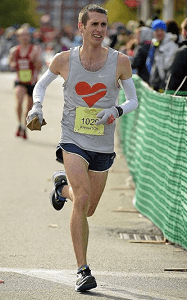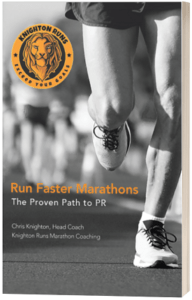Don’t Become a Marathoner?

Don’t be come a marathoner, or at least not yet.
Marathon mania has created a culture in adult running that places way too much emphasis on the marathon as the wholly grail of running achievement. I love the marathon, but far too many runners never even come close to reaching their potential in the sport because of their fascination with 26.2.
The marathon is great if you just want to finish it. Running 26.2 miles under your own power is one of the most rewarding and outstanding things a person can do. It’s an amazing achievement and something to be proud of. I think most athletes SHOULD strive to run one. But most athletes will not become a better runner by becoming a “marathoner.”
After you’ve checked the marathon off your bucket list, get back to getting fast.
When I say “marathoner”, I mean the type of runner who signs up for two or more marathons a year in a repeating cycle of “Spring Marathon, Fall Marathon, Spring Marathon, Fall Marathon….”
Most athletes do not truly respect the marathon distance and enter their first marathon before they are truly prepared to run it well. Then they become comfortable with the distance. Running far is not that hard once you become reasonably fit. Running fast is what makes running hard. Serial marathoners become proud of their marathon finishes, but struggle to improve their times significantly from one marathon training cycle to the next. If they see improvement it just most likely due to being a new runner and getting generally fitter, but it will eventually plateau at a level far below their potential. Many others are constantly dealing with injury from rushing into the most demanding race distances without proper preparation.
These serial marathoners often tell me they are afraid of the 5K because that means actually running fast. It’s scary to run fast. I get that. The shorter distances push you to the limit. Fast races show how fit you truly are. This can be difficult to face. Sometimes running marathons again and again is just more comfortable.
There is a tried and true path for runners looking to improve their performances in the sport. Start your career in the shorter distances. The mile. The 5K. Actually get GOOD at these distances. Then once you feel like you’ve succeeded at that distance and are ready for your next challenge, move up to the 10K, then the Half….
Then run the marathon.
Don’t skip right to marathon if you want to maximize your potential in our sport.
You can get fast or you can run far. You can’t do both at the same time.
If you want to run the marathon well, wait until you are already in great shape, fast, and capable of running the high mileage that the marathon requires.
Your running career will be for ten, twenty, or even more years. You have so much time to develop in this sport. You don’t need to rush.
If you feel stuck in a marathon rut, it’s easy to get out. Just take a break for six months or a year. Have you ever truly trained to trained to race a 5K or 10K well? Give yourself an entire season to work on speed. Mix it up. You will have fun, face new challenges, and surprise yourself along the way.
And the thing is… when you finally go back to the marathon, you will be so much faster!
Join the Conversation
What’s your favorite race distance? Is too much attention placed on the marathon or does it deserve all the focus it gets? Am I full of crap? Let me know in the comments below.
If you enjoyed this article, please share it on social media so your friends can enjoy it too.




2 Comments
Tim Cronin · October 5, 2020 at 5:46 PM
IMO this is good advice — and I am definitely guilty of succumbing to the spring-fall marathon cycle for the past few years (though I’ve also done my share of other races, running and multisport!). I think for newer and lower-volume runners, part of why repeated marathoning can be a big rut is that 1) the weekly long run can become the focal point of training to the detriment of both quantity and quality of overall mileage, and 2) marathons usually take a long time to taper for and recover from. Both of these aspects can make it so that repeated marathon training actually decreases yearly average mileage *and* means that far too much training mileage is run slowly and on tired legs during long runs.
Coach Chris · October 5, 2020 at 8:21 PM
Thanks Tim!
Those are great points. It’s easier to be more consistent with mileage and have the opportunity to race more frequently when focusing on less fatiguing race distances. This could lead to more rapid fitness development.
One of the biggest challenges I deal with as a coach is training athletes who run less than 50-60 miles per week for the marathon. The 15+ mile long run is such a significant portion of their weekly mileage, that is hard to properly balance length of mid-week runs with the long run and overall recovery. In general, I feel like an athlete would be better served to develop their speed and mileage focusing on shorter distances and then take on the marathon once faster and running high volume.
Comments are closed.